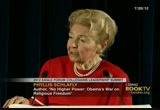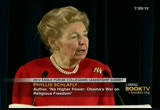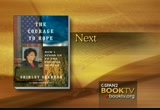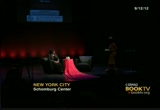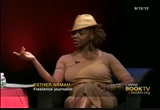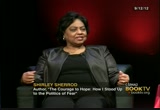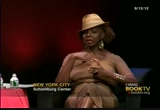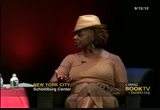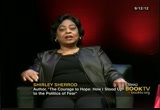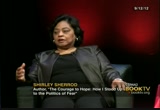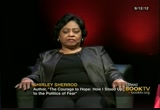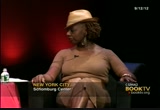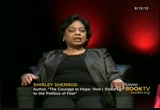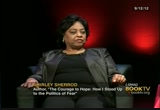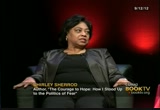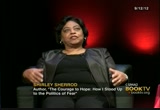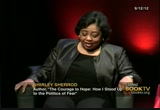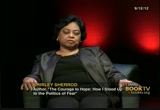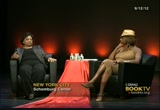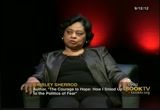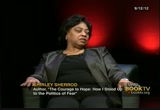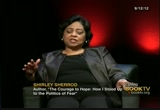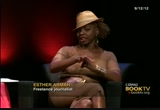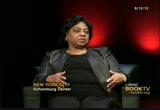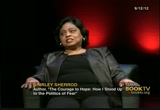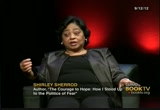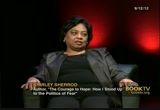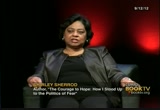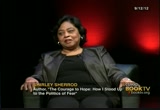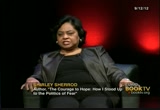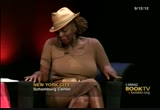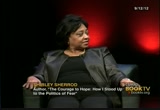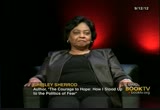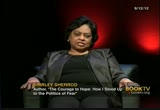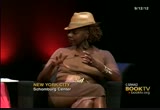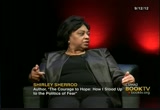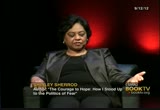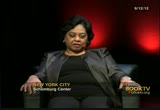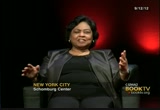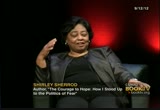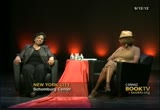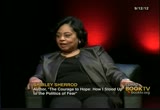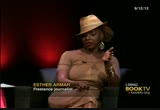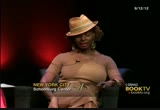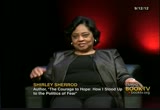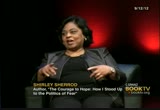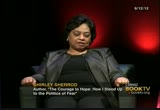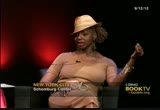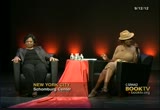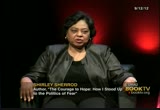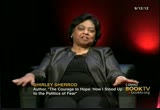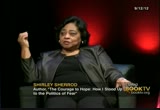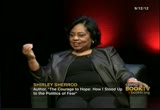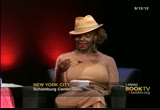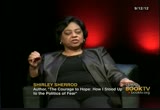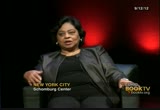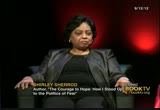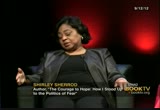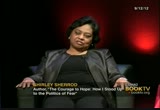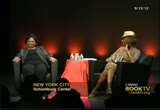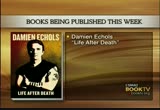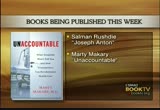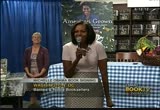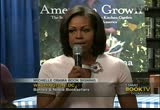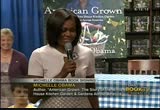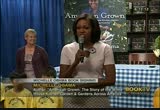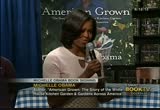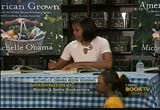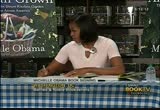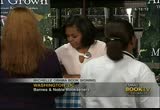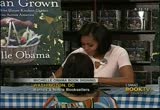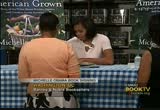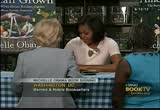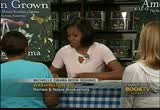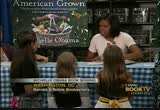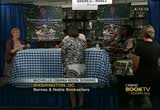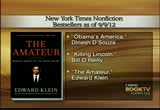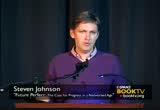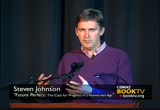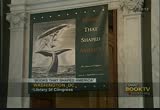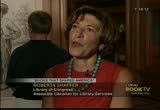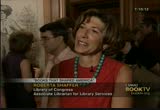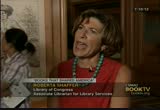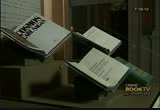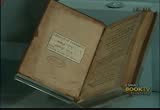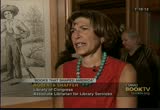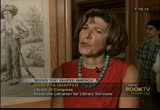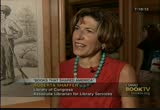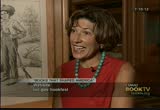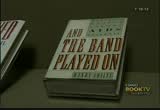tv Book TV CSPAN September 16, 2012 7:30pm-9:00pm EDT
7:30 pm
the schools and colleges along the way and then she has a baby. no sign of a house than. the government is hoping, taking care of her and then she ends up on social security and medicare on the end. enter a whole life is made possible by the government. that is not the kind of country we want. look at europe. we don't want to be like europe and we don't want any of these u.n. treaties because we don't need any foreign export in geneva or belgium or anyplace else to tell us what to do. we believe in freedom. the first, as i say, i think every president we've ever had, including the ones i don't like spoke publicly about their faith and belief in god and asking god's blessing and the blessing
7:31 pm
of america and one nation under god. and we don't want anybody taking that away from us. you know, there've been lawsuits against even the pledge of allegiance. they have not succeeded with those yet, but who knows if one of the greatest powers of the president is the power to appoint judges. if obama points another alayna kay hagan, that will control our country for the next 50 years. we can't afford that. so your up for this
7:32 pm
in the late conservative blogger andrew's release of eclectic and that she delivered to the georgia naacp. the clip made it appear that ms. sherrod was guilty of racial prejudice and on july 19th of 2010, she was asked to resign her position. it leader became apparent at the video and would it selectively excerpted pieces from the speech and her critics and the obama administration of will just for their rush to judgment. shirley sherrod was offered another position with of the department which she declined. this is about an hour. [applause]
7:33 pm
>> we all need a minute, right? [laughter] >> [inaudible] >> this is a really special moment for all of us in this room. only in new york for one night here with us and i should let you know right away that if you would like to ask questions at the end you need to write them down on the car in to the carter and we will take the questions from the audience at the very end.
7:34 pm
i want to start with -- we had a beautiful conversation on the phone. in a chapter 1 as a child you would drive down the road of georgia and house garrey that was the would terror by somebody >> it really was scary we liberated let's say baker county but to have this happen, to have a blocker -- blogger, you are trying to do the best you can
7:35 pm
for everyone. to have someone take your word to use the equipment they have today to make your message appear to be the exact opposite of what it was and is is an unbelievable situation and we to terrorize someone because you don't know that you would ever really be able to get the truth out. but i was determined even if i had to tell one person at a time stat it makes me think there's this whole media kind of energy and around the book last time there was this it was in july of 2010. we were going back to those places making those accusations
7:36 pm
the speed at which that happens you do have the whole story. >> it feels good to know that i was able to use that same media in a sense to be able to get the story, the right story out. i can't explain how great it feels to be able to sit here my goodness i don't know whether you saw me i was crying in a little. it's really amazing. i didn't ever think -- i made the decision years ago that i didn't want people to forget my father and what he meant to us. i had no idea that i would be able to tell the story in this way. it feels great. >> what's so beautiful about this book? its more than a book.
7:37 pm
it's a living history. it's like a love letter to choices, and it reminds us that without the feelings, the facts don't convey enough for the history has been and that is brittle in the history of african-american struggles for humanitarian rights there have been humanity and love and family in the traces and possibilities and sacrifice. i wonder if you could go back. i know you are from the jim crow south [inaudible] >> tell us about that. >> we were in baker county. you hear about and read about the early years, but the data
7:38 pm
and the sheriff in our county wanted to be known as the data it actually ruled everything, everyone in the county you can't imagine anyone like him that it's worse than what you've seen in the worst lesson. my family lived -- my great, great grandparents had come to baker county and i don't know whether they can as sleeves or not the area that i grew up is still today called ha kingstown, lots of family that was they lived in one area, williams and another, but we were all one big family and we felt that we have
7:39 pm
to help each other. and so, i was raised on a farm, and my father -- there were five girls in the farmer wants us on to my guess any man wants his son but my mother and father kept having babies and they were all girls. we all had a boies nickname at. i was bill. [laughter] >> that is hilarious. >> but as safe as we could be in a situation that we were in, we felt safe and comfortable. and i feel like my father wanted us to have an education. he knew that education was the key to a better life that i really think that he thought all of us would come right back on and try to work from their and i grew up with lots of family and community support.
7:40 pm
they would supposedly give us equal, separate but equal facilities. i only attended a segregated school. but in those schools, we had people who care and teachers who care. but one thing they drilled into us and our church and in the home town and in the schools was that they expected us to do good. they expected us to go and do good and reach back and help others. [applause] >> of course we know in the country right now we are in day three of the strike in chicago for the education push she
7:41 pm
itched. go back to that time and how your family worked through that. >> when i look back at those days my father seemed to be about as happy as any man could be. he convinced my mother to try one more time to have a son. my youngest sister was eight but he wanted to try one more time. this was a boy. she stayed sick for so long and we were concerned and one day at school my best friend asked me how is your mom? she doesn't seem to be getting better. your dad was at the store yesterday to dig out cigars. your mom is going to have a baby. [laughter] she told everyone that this was a son so she was on top of the
7:42 pm
world. we were getting a new home built the administration to build a home he wanted a bigger home but the supervisor told him that a black person couldn't borrow the money to build a brick home so they had to pick the smallest blocks they could so they were getting a new home and he was setting aside one room in this house just for the sun. so the oldest was about to graduate from high school, and run off to college and then suddenly we went to church the day before and i was driving the family to church. we met this man on the road to church come under rhode. we stopped and he told my father he was coming to get the cattle
7:43 pm
and my father told him if you come back tomorrow i will bring others said they agreed to meet the next morning at 9:00. the next day we got up and went to school and the principal called on the intercom for me to come to the office. i went to the office and that is when they told me that my father had been shot. they'd sent from my other sisters and they were afraid of the teachers and principals didn't really know what to do. but finally one of the teachers said she would take us to the hospital where he had taken my father and she was so afraid i can remember the way this little town is there is the small bridge across the river into the next county and you could barely get to cars to pass each other on this bridge but it is the only way to get to the next
7:44 pm
county without giving me the 30 miles out of the way. but you have to go through -- you're supposed to go through the little downtown area to get to the bridge and she actually went way around to keep from taking this to the hospital. when we arrived at the hospital the had actually moved him to albany said it was the next day we got the chance to see him. he lingered on for ten days before dying and i can remember on the night of his death my mother was seven months pregnant, and the baby was a boy born two months after my father's death. she was seven months pregnant and people were coming to show support to. i just didn't want to be around anyone. i went into one of the rooms and as the oldest i felt like i
7:45 pm
needed to do something. i felt like if i had been a boy i would have gotten a gun to kill the man and that came to my mind but i couldn't do that. my father tried to teach us one day to fire a weapon and all of my younger sisters were taking their turn with the gun but when they put it in my hand all i could do is cry. so i knew i couldn't get a gun to go and try to kill the man but i need to do something. i didn't intend to live in the shadow. i wanted to get away from baker county so i was applying to the schools in the north and let them know at the time when. because of the conditions we were living and i said i didn't want to have anything to do with a farm again in my life.
7:46 pm
>> i would talk to them and say you just wait. [laughter] so, but the thought came to my mind the thing i could do would be to give up my dream of living in the north, to stay in the south and devote my life working for change and i remember i felt koln after that. i couldn't share even that with anyone. and i didn't know how i would do it. we were not involved in the civil rights movement. sherrod and others had been moving on the movement since 61. this was 65. they also started the movement in several other counties. they had the worst reputation and she hadn't come to the
7:47 pm
county to get the movement but when my father was a leader in the community and murdered that is one thing that brought everyone together and they were ready when they came in the baker county movement. >> what's interesting to me is in the book you write about the legacy of how it impacts you as a family. you talk about the fact that when that happened the black children that went to the school they couldn't make any white friends and the front themselves living in no-man's land. i don't think we get the chance to really feel the price that those young folks paid to be where we are that we get to feel it and we know it intellectually an it's something beautiful but your book does.
7:48 pm
>> in june of '65 and in august of 65 my sisters and about 15 others decided to integrate the white schools. i can remember the first day i had graduated and i was coming off to college in september. we took them or we tried to take them to the school, but of course it was about a block away stopping us. they couldn't start the first. the next day like we would do in the movement things would happen. you called the justice department and can't always get justice. some of the people were klan members, too. but they were eventually able to
7:49 pm
start school but there were signs in the school another tune did and the teachers referred to them as negro and they just endured so much and the finger that was so hateful then impacted venegas so much is that they had a ride on the same bus but then they go over to the white school and then it has to bring them from the white school to the black school to take the bus home. they wouldn't allow them even if it was raining to come into the black school to wait for the us. then at the end of the school year those who were juniors and seniors could not attend promised the white school and
7:50 pm
were not allowed to attend the prom at the black school. now, we have a program about three years ago because that's -- these are older people some of them 60-years-old now. we have a program where we got the congressman, the secretary of state. we did a lot of things to try to help them to understand we appreciate what happens to them. but even though that school we've turned it into a center for the community and this is one of the things we have done we could hold on to the building which was a separate but equal facility we have a commercial kitchen people can come and make products and get it on the
7:51 pm
marquette. we had headstart and other programs. those individuals who were so much as juniors and seniors our own people still don't feel comfortable with going to that building to do anything. and this is all those years later because they remember what happened to them. even though the people who did it many of them are now living the still can't let go. this idea that the legacy stayed with us from generation to generation. we carried what happens emotionally even though there is a celebration of the fact of the landmark case and the fact that the schools are desegregated.
7:52 pm
the reality of those that want their journey is to experience and i would appreciate it such a beautiful thing we the book fills in the gaps that are routinely left out. you can feel that and a brevet. when your mother was seven months pregnant you say that there really taught you about how strong your mother was because the family changed so radically that you also talk about the fact at that time somebody dies there's nothing to help the family deal for the potent. >> these days they tried to be -- to bring counselors in. we didn't have that. each of us had to deal with it in our own way and then you know, my father was murdered in
7:53 pm
march, we started in june. two weeks after i left to go to school at the state they called and said a group of white men burned a cross in front of our house. my mother and my four sisters were at home. like i said, we had moved into the new home in fact one week before my father died so he was with us in that house one week and then one of my sisters was sitting out one night in the timber so a line of cars in that area you can see a lot of cars and you kind of wonder what's going on. so she actually went. my mother was in the bed to tell her there were lots of cars coming down the road.
7:54 pm
i don't know why she thought that. but my sisters all the cross burning and my mother actually went out on the porch and said the light was so bright she could actually recognize some of the white men who were not there. but what happened is she told one of my sisters because we were organized in the movement, she told one to get on the phone because debate could to call some of the black men and believe it or not if they hadn't stopped some of the younger black men that night he probably would have read about that incident because he was ready to kill some of them. [applause] they actually allowed them to leave. they had surrounded these white men and above them to leave and then suddenly the data shows that with some investigation people were all aware of what is going on and nothing really happened as a result of
7:55 pm
identifying some of the people. but my mother, when daddy was living we felt like there were six girls but she really grew up, and 11 years after my father's death when my mother announced i'm running for office, i couldn't believe it, but i was happy. [applause] without your they also decided he was retiring but he decided one of the suns would now become the share so he was running for office, so we were running into some of them as we campaigned around the county that summer running into some of them. and then on the night of the
7:56 pm
election we were all in the courthouse. it's like something out of the movies. we looked out of mississippi and the police's right there in georgia. we were at the courthouse that might standing because they were counting the paper ballots and we were watching them count the ballots it looks past us and spoke. he was angry because we have been having meetings and my husband kept telling me not put another johnson in office. they got the word back to him so that is why he was angry. so, he walked a few feet away and came back and said i take that back. i didn't know who you were so he's standing there with a gun
7:57 pm
on his side and my husband is standing there and they are staring each other, just staring at each other. i was about to have a heart attack. because i knew that even with all of those people in the room, she was going to pull his gun out with everyone there to shoot. but someone ran outside and got his gun, the one that was running for office, then he ran and a drug status by the arm and said let's leave that alone. so he told his dad outside. i can tell you that night driving from new income the city where the ballots were being counted it's often about 20 miles away it was very scary because we had to go up highway 19, and i didn't feel like the data felt it was over, but he did win.
7:58 pm
my mother one. [applause] she became the first black elected officials in baker county and believe it or not, is still serving. [applause] we convinced her this year although everyone they were all digging her please stay in because she has been the voice for people on that board for all people. the first meeting back in 1976 the superintendent introduced her rows -- he said i want to introduce the newest board members. there was able to board member that said [inaudible] i want to tell you that is an honest man.
7:59 pm
he found my wallet and brought it to me and all of the money was still in there. [laughter] >> but she is a strong woman. we convinced her to just give it up. you had so many things happening in education. he begged us to -- if we had gone along with her children with another four years, i am sure she would still be there. but we thought at this time it's hard for her to enjoy her life a little more. she's always on the case, whether it is an education or wherever, she is the person that people go to in the county for him. [applause] so, with all of this political activity still manage to find
8:00 pm
8:01 pm
he met them and then they kept talking about the other sister they had, and he wanted to see a picture and they showed him the picture. he said i'm going marry her. sure enough, within two years we were married. [laughter] >> yay! and so you get married and you and your husband are working together. you're both in the movement. you're really dealing with the issue of farmers and discrimination and establishing the degree to which the discrimination works. and then you are pregnant with your daughter, russia, and he decides he's going take a trip to israel, to find out how to figure out farming in a different country. you just had your baby. >> you know, when i married him, i realized i was marrying a person who was married to the
8:02 pm
movement. [laughter] and i admired that in him. i had to share him with everyone always. >> but it's beautiful the way you write about when he has to resign and he called charles on the phone and charles was the one who shooted your spirit as you were driving home on that july in july 2010. and so we have something in common. you made a trip to ghana. you took a range of trips through the scholarship. you write about that in the book. go in to ghana. stand in the space where potentially your ancestors, those who were enslaved africans may have come from. what that was like what? >> oh my goodness. i can remember, and the reason i have had the opportunity to go, i had a applied for a kellogg foip and didn't think i'd get it. during the final interview, one person asking me, is there
8:03 pm
something you have always wanted to do that you have never had a chance to do. i said yes. he said what? i always wanted to go africa. where? ghana, kenya, i started naming countries. fist thing i did after i was notified i had the fellowship, i went to ghana. i was so excited that i couldn't sleep, i mean, i was just -- the thought of getting to africa, you know, a place where my ancestors came from, i couldn't -- it was just more -- i can't describe what i was feeling. and i couldn't wait to get there. and to ask them you know what did you think of african-americans, and just! [laughter] i asked everybody. [laughter] >> and it's interesting because i know the travels that's what you see this threat through your
8:04 pm
book of trouble and challenge and discourse and your choice to find a way a resolution every single time. even in ghana you have the dinner with thely -- where african-americans you have to got in there and become the united nations. you get your way through so the threat and you come back to the farm and you're working in terms of dealing with the discrimination the black farmers are facing. you're on the other end of the usda. you're seeing how the discriminate story policies what they are on the ground. seeing have their land foreclosed upon. there was a mean spiritednd about the way they were foreclosed on their land tell us about that. >> one of the things i had to do, i was determined and determined that everyone who worked with me did that, we -- i made sure we learned those regulations better than the folks they had working in the
8:05 pm
offices. so that you would know when they were doing something or saying something wrong. you knew. you could know when you were anyone who ever had to deal with discrimination, know when it happens but to know exactly what that person is doing to you that's wrong was what i wanted us. i needed to be able to do that to challenge that. i can remember a farmer called me, he had received a letter to come in to the local office, which ask about sixty miles away. he asked me if i could come to go to the office with him, and with his wife, and i said yes. i drove down to that office that morning, we went in to the office with the county supervisor, and he started telling the farmer that he was going foreclose -- the farmer had a farm ownership loan and a home ownership loan. two different types of loans.
8:06 pm
he described the process. he he said he would foreclose on the farm first then the house. his wife started crying during the speech because the guy would never stop. i was trying to give him a chance to finish what he said. but he was obviously he was going to keep talking and not give us a chance to talk. i stopped him and said put it in writing. he said no. i ain't putting nothing in writing. wait he didn't say that first. when i said are will you put that in writing and he started looking at his feet. he vently turned the chair all the way around looking at the floor and then looked at me and said i about putting nothing in writing. we went at it. did we ever. i wish to this day i could remember what i said to him but i can't! you know, e eventually somehow
8:07 pm
we stopped and he told the farmer that he would get a letter in about six weeks, and so he was outlining the process. then the farmer had a bad sinus problem he coughed a lot. he said you should do something about the cough. i want do you know that every time that farmer got a letter stating what action they would take, we appealed, i went to so many appeal hearings. sometimes i forget, what are we here for this time? but i stayed on that county supervisor's case i submitted so many complaints that he eventually left the agency. [applause] [cheers and applause] and that land is still with that farmer today. [applause]
8:08 pm
on the other hand, i had a whoit farmer. you have interesting things to happen. the one white woman from baker county where i grew up had a boyfriend who had a farm. he was experiencing some problem. so she wanted me to come to lunch at her house, a black woman that i knew was her house keeper and cooked. so i -- i took my husband and said you have to go with me now. [laughter] so we went to lunch at her home, and then from there the white farmer and the sun we were going from there to the county supervisor's office about ten miles away. we walked in to the office, the county supervisor was expecting the farmer, he wasn't expecting me. so we walked in together so to get rid of me. he wasn't sure why i was there i
8:09 pm
guess, he had heard about me. many of them had. so he told the farmer to walk down the hall to another room. the three of us walked down the hall to the other room. so he knew then without a doubt i was with them. so he sat down and started talking to them. he tried to turn in such a way he was turning his back to me. but every time a response was needed, i responded. i didn't let the white farmer respond. so finally he realized he had to talk to me too. and of course, i dealt with the situation for that white farmers. there were many, many, many situations i'm sure i heard in east georgia one of the county supervisors was saying tell her she better not come over here with the mess. i went one day. [laughter]
8:10 pm
[applause] let me tell you about that quick. >> tell that story. >> this young black man, his friend was giving up the farm, and he was interesting in farming. now he had just been highlighted in one of usda publication because he worked with the soil conservation helping a white farmer, but do you know when i prepared his business plan, they denied his loan for lack of experience? [laughter] so i told them, the process for dealing with that is that you have to within the first two weeks of the denial request an appeals hearing. he called me, i said request the appeal hearing and i'll be there. do not tell her it was a woman, do not tell her i'll be there with you. so on the date he was given for the hearing, i had to drive 150 miles to get to him. so by the time i was there, i
8:11 pm
was god and mad. [laughter] [laughter] and i heard that they said don't come over there in the area with the mess. i was doing it. the poor woman. i think about it now. she wouldn't sit. i was on her so she was trembling. the young man got his loan. [laughter] [applause] i felt bad about the way i treated her but [laughter] >> i think it's important to understand that you come from a space where you have been on the receiving end of the discriminate story practice of the usda when you walked in to the usda to become the first directer of world development, the first black director of rural development in the present administration, you had this
8:12 pm
unique history of having personally experienced the discrimination and having helped black and white farmers. you had all these stories that proved that again and again and again and again to the point that in the book, when you were -- when you submitted your resignation all the support came flooding in from the pardon mors about the stories you've been telling, one of the letters of support wrote about a usda loan official who kept a noose in his desk when people would come to visit. kept a noose in his desk. he would open the drawer and you would see it while he was having a meeting. that was a reality you walked in to. and you get fired by the first african-american president. >> yes. >> so we're going -- we did all of that come all the way back to the beginning of july 2010, and the president does call you, and
8:13 pm
when you read this in the book, which is what you call i'm having a conversation with the president of the united states. [laughter] tell us what he thinks about it now. talk a bit about that conversation. >>well, you know, when he was -- when i was actually here in new york, i had just been on "the view," and was in a memo on the way to the airport with cnn when i received a call that was 404 area code, it's atlanta so i answers that. it was congressman john lewis. when he finished talking i decided i should check my text messages. i couldn't keep my voice mail clear enough to keep getting messages. there was a message from the white house saying the president was trying to reach me. so i called the number, and they wanted to arrange the call, so
8:14 pm
it's so interesting the people in the immediate yew. the person who was in the car with me from cnn start the pull out a camcorder, i said you cannot tape me while i'm talking to the president. so i made her turn it off, and put it away. [applause] so he started out by saying you're a hard person to reach. [laughter] well, everyone knew i'd been with cnn all week. i didn't say that to him though. [laughter] but anyway, he started out saying, you know, vilsack would be calling me about the position they wanted to offer, and then he said you know, those issues you've been putting out there all week i'm well aware of them. i said no, you don't understand
8:15 pm
those issues the same way i do. we went back and forth. i'm talking to the president, but i didn't -- [laughter] well -- [laughter] he's trying to tell me, yes you do if you read my book you'll understand. i said no you don't understand the issues the same way i do. we were going back and forth. he was trying to tell me to read the book and i'm saying no. family i said you know what? you should come to southwest georgia, and he said sanford has been trying to get my to come. sanford is the congressman from the second congressional district where i live, and i said well you should come and when you come, bring michelle obama with you. so we left it, you know, that it
8:16 pm
might happen, but he also told me the young man who arranged the call could get to him. if i had a message for him or a issue or whatever i could contact that young man. i didn't keep that number though. i don't do stuff like that. [applause] >> well, [inaudible] since the president kindly offered his book, i think we should kindly offer him your book. [cheering and applause] a signed copy. right? we're going to take some questions before we finish up. and you'll get your chance to get your copies and she is going to be signing those. i know, that folks have written questions down. daisy is going to bring us some questions we're going to be able to ask you. so that you can have a
8:17 pm
conversation with the questions from the audience. it's so emotional for me. my father was in the movement. my family was in the movement and this is a beauty the and the power the way living history crosses borders, breaks down boundaries, and that the truth, when it comes to this history is a global one universal one. i feel like in the way you wrote it, i got a chance to hear things that my father never got a chance to say. and i think one of the things is transmitted from generation to generation is the silence because the pain is to deep. what you do is sphit fit on the scar and you left that silence. that's a beautiful thing. it means there's a whole generation to get a chance to unthe portion of the jim crow south. in a way they could not possibly have done. the bock should be in schools.
8:18 pm
it should be in the curriculum. for real. right? [applause] we're going take a few questions . okay. do you believe that integration was enough to dismantle white supreme sei and exemployeation of african-americans and what else do you believe needs to be done when it comes to racial and economic injustice? >> integration obviously wasn't enough. we thought i think back to when we were integrating the white schools, we thought simply putting our children there was enough. we didn't provide the support that was needed to help them get
8:19 pm
through that experience. and we sort of let white people off the hook with that as well. they did the things they did, and it was for us and baker county, at least, it was at the time when people thought, okay, we have done that. we can register to vote. we can eat anywhere, he can sleep anywhere. our children in the white school and we have done the job. we didn't. there was so much more that had to be done and those of us who live through those years of segregation and jim crow, the hurt was so deep that we department want our children -- didn't want our children to experience that and know that, it's almost like we wanted to wipe that part of slavery and those years away so that our children can just be in this
8:20 pm
society and move on. so much is happening to them that they don't understand because they don't know the history. [applause] [applause] we have farming questions. what are a main challenges in do. developing the next generation of small farmers and with that in mind, what is the community planning? >> okay. well, just like me, just like i was back in those years, when it comes toking agriculture we think of picking cotton or shaking peanuts. but let me tell you, there are machines to do that now. it fakes almost an educate person to run those tractors and those tractors have fm stereos
8:21 pm
in them with air-conditioning. they -- when it comes to agricultural, we run away from it. so the land, the land you all that we had as black people, most of it is gone. [applause] woe didn't realize the asset that our ancestors coming out of slavery acquired and left for us. so we're around 1920, 1910, right in that era black people owned almost 15 million acres of farmland. today that's down to around 12 million and we're still losing. growing your own food and getting in touch with the land, you know, you can learn just
8:22 pm
about -- you can learn so much in life so much that can take you through life by connecting with the soil. our kids can learn just growing -- they can learn math, they can learn to read! there's so much to be learned. so much that the earth can give to us and in addition, good wholesome, healthy, food to eat. we need to know how to grow it. [applause] [applause] >> when we think about the challenges with african-american communities and food doesn't do it justice and the challenges to getting fresh food in to communities we get the dagger on the corn. another question about farming was this was how do you -- how does one considering farming for a living compete with the kind of thing corporation squeezing
8:23 pm
out the small farmers with volume and land purchase. >> let me tell you something we're doing now. all of the food systems are being mandated to by local produce. the thing that is keeping our farmers small farmers from being able to access that market and others like it is that you have to have a facility to be able to bring that produce in to be properly washed, rated, packed, cooled, before it can be delivered. and in some cases, chopped or sliced. one farmer one small farmer alone can't make that happen. but getting farmers to work together in groups, they can. so right now in albany, georgia, that's one of the major projects i'm working on trying to get a
8:24 pm
process and center for farm ores to be able to use so they can access markets. they don't need to compete with farmers trying to sell to public big chains. they can't. there are markets all of us need to eat. all of us need to eat. they have markets right around them, and people who are right around them need to support small farmers by buying from them. [applause] >> this is going to be the last question. many of the questions overlap each other. we are covering a lot of ground. we are covering three or four questions at the time. the last question. who are the heroes that inspire you? and specifically for a younger generation what advice would you give to a younger generation facing discrimination the way you did as an child an obstacle in their lives. what would you say to encourage them to speak out for justice?
8:25 pm
>> there's so many well known people who inspire me. some of the people that inspire me -- that really has such a impact on me and the work that i've done, the people that you don't hear about. those women in communities who give day in and day out not for the recognition they get because they'll never be recognized for what they do. but they give over and over. and they're not afraid. i can remember my husband talking about an older woman in lee county georgia. she's deceased now. she called her momma dally. she was a midwife in her earlier years. she would sit up at night with a shotgun patrolling allowing the workers to get some sleep.
8:26 pm
and -- [applause] and, you know, -- [cheering and applause] my own aunt joe sei, during the first march in baker county as white men were beating charles sherrod nearly to death, she threw her body over him and said if you don't stop imrowl kill him. it's people like that. people who don't look for the recognition they help to make our commune its work. -- communities work. [applause] >> there's a question about new communities. >> yes. >> new communities there's still life. we created the organization back in 1969, and due to discrimination, we lost the 6,000 acres that we had in 1985,
8:27 pm
and that was discrimination due to, i mean, discrimination on the hands of the county supervisors at farmers home administration. we became, i say we the communities became one of the claimants in the case and ended up getting the largest award in pig ford. and because of that -- [applause] because of that, new communities bought more land, and we have programs they l they'll be on that land beginning next month. they'll be harvesting pecans, they're -- believe it or not you can grow oranges in georgia. [laughter] they have oranges . >> and peaches? >> not peaches yet. we'll be planting peaches. and probably busting out grapes like we had in the old communities and doing lots of training around agricultural
8:28 pm
culture. we have a racial healing project going. that's some interesting work to be able to sit down with white people in the area to talk about race. [applause] the book, not a book, a living history i love letter to the revolutionary practices forgiveness, the importance of choices history is more than information. it's that silence from generations to generation does not help us create a better presence. [applause] we have to open it up. >> courage to hope? i stood up to the poetry from shirley sherrod. [applause] [applause] [applause]
8:29 pm
[applause] next weekend on booktv on c-span2, the 2012 annual national book festival will take place on the national mall in washington, d.c. some of the panelists and guests that will be covered live include doug brinkly, daniel, sally smith, david and jewelry nixon eisenhower, tom freeman, these are some of the authorities. join booktv on c-span2 next weekend. >> here's a looked at books being published this week. in life after death, dameon one of three individuals convicted of murder known as the west
8:30 pm
memphis three trial recounts the experience while incarcerated. the thoughts on the judicial system and the release from prison in 2011. jeffrey, staff writer for the new yorker exams the relationship between the obama administration and the supreme court in "the oath" the obama white house and the supreme court. in free market revolution, how rand idea can end big government, president of the substitute and don watkins and forbes.com argue that the ideas can help decrees the size of the government and assist the u.s. economic recovery. solomon rusty recounts his years in hiding. inside look in to the health care system and argues that it needs to be more transparent in order to protect patients in
8:31 pm
"unaccountable, what hospitals won't tell you and how transparent sei can revolution nice health care." civil war historian james recounts the importance of the northern and southern navies. next month. in-depth guest science and technology writer steven johnson outlines a model of political change in "future perfect." look for these titles in bookstores this coming week. and watch for the authors in the near future on booktv. and on booktv.org. [applause] [applause] [cheering and applause] >> how are you guys doing? [applause] can you hear me?
8:32 pm
[applause] good! wow! this is so exciting! [cheering and applause] >> this is my very first book, and my very first and probably only book signing. this is so good. this is so good. well, you know, let me just say, i am so proud of this product. it is the book "american grown" is everything i would have imagined. i wanted the bock to be beautiful, and i think the pictures are absolutely beautiful. i could tell because when malia and sasha picked it up it's like mom, your book, how nice. they actually got pulled in bit pictures. they couldn't put it down and they started looking through and started actually reading it and eventually i got a thumbs up. so that's what we hope the book will be. i mean, the book is really not just the story of a white house
8:33 pm
garden and how it came to be and how we had our ups and downs and trials and tribulations. it's also a story of community of gardens across the country. everything from a wonderful community garden in hawaii. to some excellent school gardens that are happening in right smack dab in the middle of new york with some great school kids. the stories of the work that people are doing across the country are really an important part of the book as well. but we also talk about one of my key initiatives, which is "let's move qts. it's about getting our kids healthy. the book shares that journey and some of the interesting statistics and work that are going on all across the country to help our kids lead healthier lives. it's a little practical too. it gets a few types, you know, i'm not the best gardener in the world. i had a great team of national park service people, and i had
8:34 pm
my ban kroft and tubman kids. they are my partners in crime in this respect. i mean, these two schools have been with us since the beginning. that. that was one of the things we said when we started exploring whether or not we could plant a garden on the south lawn. it would have to be a teaching garden. it would have to be a garden that kids could participate in and understand where their foods comes from and engage not excess. because that's really what i learned in my own life is that when i involve my kids in the food they ate. we didn't garden in chicago we certainly went to farmers markets and we got them involved in really changing their diets and owning that process. that they accepted it a lot more. and we have seen that with these kids. you know, these kids are working in the gardens in their own schools. i know, they're bringing back ideas and questions to their own families, and helping to change the way they eat and do great things. these kids have been amazing.
8:35 pm
and they have just been a pleasure, they come to the white house. they don't get star struck, they don't look around. they get to work! they get to work! and they get our garden planted and harvested in a matter of ten, fifteen minutes sometimes thirty minutes. they get done. we couldn't do this without them. and i'm proud of you. so proud, proud, proud of you all! [applause] thank you! thank you for helping me. thank you for helping me. so i just want to thank you all for staying in the rain for coming out. i am just thrilled and i hope you all ebb joy the book. i hope it becomes the beginning of many conversations in your own homes and communities, and i hope that it leads to a healthier generation of kids at some point. in are also some recipes in there too that are easy to follow. they are pretty good. white house chef.
8:36 pm
i urge you to try them. thank you so much. i look forward to seeing you all up here. all right! [cheering and applause] [applause] [inaudible conversations] all right. all right. [inaudible conversations] are they coming? [inaudible conversations] [inaudible conversations] [inaudible conversations] all right. who gets the first signed copy? [inaudible conversations] thank you. thank you very much. okay.
8:37 pm
8:38 pm
see if you can see pictures of you in there? we found some. >> did you find some? we found some. thank you. how are you? it is so good to see you guys. thank you so much for coming. thank you for taking the time to come out. are you a gardener? [inaudible conversations] [inaudible conversations] how are you? it's so good to see you. oh my goodness. it is so good to have you. [inaudible conversations] that's a good way to end the year. thank you so much for coming.
8:39 pm
oh my goodness. hi, how are you? god. [inaudible conversations] thank you so much. i remember. thank you so much! [inaudible conversations] [inaudible conversations] are you ready to party? you're going to keep reading, right? [inaudible conversations] all right. [applause] thank you for being here. they're going to keep you excited. i want to make sure that i get you -- [inaudible] i know me, i love everything. [inaudible conversations] have a great day. you too! oh my goodness.
8:40 pm
[inaudible conversations] yeah. yeah. thanks for taking the time. thank you. thank you. we love you. we love you. [inaudible conversations] watch out. hi, how are you? okay. [inaudible conversations] how are you? it's so good to see you. are you a -- [inaudible conversations] [inaudible] all right. thank you so much for coming. thank you. how are you today? it's so nice to see you. all right.
8:41 pm
all right. oh any goodness. thank you. thank you. oh yeah. but i have eaten them. it's easy to follow. really easy to follow. thank you. thank you. [inaudible] [inaudible] i appreciate you coming. thank you so much. how are you today? how are you? we are doing it for these kids. [inaudible conversations]
8:42 pm
8:43 pm
i would be in the same poet. keep it going. thank you. thank you. how are you? it's so good to see you. thank you so much for taking the time. oh, my pleasure. are you gardening? excellent! give him -- we're very proud! i will. thank you. [inaudible conversations] it's wonderful. hey. what's going on? ladies, tell me names, ages, all the vitals. [inaudible conversations] are you going in to high school? congratulations. what's your name? [inaudible] you're eight? >> excellent. what grade are you going if in next year?
8:44 pm
you're eleven? are you interested in gardening? healthy eating. >> yeah. all right. you're going to spread the word to other kids about eating their vegetables, right? all right. thanks for coming. the girls went to their concert but i don't know their names. sasha said -- [inaudible] they're a local group. >> yeah. it they're not like your age or anything. >> no. all right. we can try that. yeah. [inaudible conversations] [inaudible conversations]
8:45 pm
[inaudible conversations] here are the best selling non-fiction books according to the "new york times." the list reflects seattle for the week of september 9th. first is the "glass castle." a contributor to msnbc.com recounts the nomatic and dysfunctional childhood. in the second spot laura details the olympics runner's time in world war ii in "unbroken." she recounted her 11 mile hike along the pacific coast and how it changed her mental health. the plans if are second term in "obama's america: unmaking the dream." "killing lincoln is fifth. edward argues that president
8:46 pm
obama is unfit for the united states presidency in "amateur." number six. at number seven is the immortal life of hen yet she tells the story of a woman who sales were taken by scientist leading to research break throws on polio and cancer. the biography of joe paterno . followed by did the double cross. the true story of the d day attacks from the point of view from double agents and number ten is a "stolen life." which chronicals the life of a woman kidnapped at the age of 11 and held captive for 18 years. you can find more on the best sellers by going to ny times.com and clicks on on arts. we underestimate how much we
8:47 pm
forget of our own ideas. and of the things we read. we're terrible even those who have god memories forget. marley if the idea is hunch like thing. it's this fleeting sense that something is interesting and is disappears. and so one of the things that i found a lot of people doing i try it do. not just to write everything down but to keep everything kind of together. don't over organize your notes. don't put them in folders or things like that. you want to allow interesting collisions to happen between your ideas. but the important thing to go back and rereader all those notes. go back an look at your notes from six years ago and revisit that kind of past self and all the ideas he or she had. that's what the common place book was like for most of the great minds of the enlightment. they would stitch together the passages from books they read they were inspired by and they would write their own notes sometimes and they would go back
8:48 pm
and reread the book which was itself a kind of remixed kind of sampled kind of clippings of all these other ideas and intellectual presence, their intellectual kind of self. was formed by the constant rereading and reimagining of ore people's ideas. >> steven johnson will be the guest next month taking your calls, e-mails and tweets on in-depth. the science write will look at the cyber world popular culture and computer networking and politics. live sunday october 7th at noon eastern here on c-span2. now next weekend down here on the national mall the national book festival will be taking place sponsored by the library congress and one of the exhibits at the library congress tent will be books that shaped america. here's a little bit about that. there's a new exhibit at the library of congress and it's called boobs that -- books that
8:49 pm
shaped america. booktv is taking a tour of that exhibit and joining us is the library of congress but, why do you call it books that shaped america? >> well, we actually call it books that shaped america as a opposed to some of the other words we considered like changed america. because we think that books slowly have an impact on american society, and shaped seemed to be the better word to imply that kind of connotation. >> when you think of the word shaped and what you said, what book in the exhibit comes to mind? >> actually, that's the fabulous part of the exhibit. no one book is shaping america. so many books have had such a profound influence on american cultural, and society and indeed the very essence of what america is. that it would be impossible and it really would be improper to pick one book from the 88 that are here. >> okay. there's 88 bock finance starts
8:50 pm
out it starts with common sense. >> yes. the earliest book is actually ben franklin's bock on electricity. that's 1751. so we have two books about common sense in the show. one is dr. spoke's book on raising your child in a common sense way. and thomas paine's book that sparked or shaped the american revolution. >> now when we see these weaks, are they first edition. very rare? >> they're not all first editions or very rare. we have many books in the collection in the library of congress that would be first editions and very rare if not one of a kind. but we have selected bocks for a variety of reasons. some of them have inscriptions by other famous people or by the authors themselves. two books in the collection that i just adore are books that are part of the armed service book outreach to people who are serving in the military.
8:51 pm
and so we have two examples of books that soldiers are sent or were accept i should say. i believe now they are sent books to read at the war front on ipods and other things. but at los in the olden days. >> what are the two books you have. >> i believe one is "tar disan" i'm trying to think what the other one is. but oh my goodness. >> while you think of that, in the exhibit, a lot of novels. >> yes. and novels are critical parts american cultural. not only novels that people read, the common people read, but some very highbrow and complex -- novels. some novels that appeal to people of all ages. some children's books that appeal to people of all ages. the "wizard of oz" charlotte's web hardly limited to a children's audience. >> "goned with wind is here too.
8:52 pm
how did do they shape america? >> many identified who we were becoming or the aspirations we had as nation. others told about experiences that we had uniquely as americans like the diaries of lewis and clark. many others really defined our dialect. huckleberry fin or nora's book. talk in dialect so they shaped not only our ideas but how we speak today. >> you also have some social curl churl books and and i want to ask you about those. you mention dr. spock. there's a couple of cookbooks in the collection and "the big book." alcohols announce mouse. >> we thought it was important look at non-fiction and books that were self-help or kind of broke barriers of certain kinds. so we looked across the broad spectrum of bobs that shaped america. we did not want to limit ourselves to a particular genere
8:53 pm
or a particular kind of book or even a certain kind of author or writing style. we look for many books that were innovative. that kind of showed america as an innovative country. as a country that looks for practical solutions that shared her experiences broadly. that used books and stories to inspire going to the front tier. and that could be literally or in the intellectual sense. >> here at the library of congress. are you in charge of the narrowing process? >> that's an interesting question. it was definitely a very large committee. with no chairman which i think is interesting. we had a number of discussions as people brought forth titles, and believe it or not, it was not all that difficult to select these books. because i think as you have implied, this is not a definitive list. there is no article the books
8:54 pm
that shaped america in the title of the exhibition. and so we were decided what we wanted to do was choose books that get america talk about books. and that was not as difficult to find consensus on as maybe choosing the fifty books or the 100 books and so we didn't need a chairperson. >> some of the books in here have created social movements. ii am thinking eye d.a. tar bell, upton sinclair. >> yes, one of the interesting it things about many of the books, they not only created social movements but some even lead to legislation. so we see the "jungle "in here it created the forerunner legislation to food and drug administration being created response not only social movements, but actually legislation actually social change. >> why 88? >> 88 is really just where we
8:55 pm
decided to stop. we were worried about using a number that is commonly associated with a definitive list. we avoided, ten, twenty five, and 100. beyond that it was up for grabs. when we got 88 we said we think that's a good number. it won't give anybody the impression that we mean this is the 88. running the span of at least two centuries we have walt whitedman. we have allen begins berg. we try to be very clear that poetry has been an impressive part of america's history and that americans have been very committed to both writing and reading poted poetry. i think it continues today. >> what about religious book >>. >> we have a holographic bible. a lot of the books they wouldn't
8:56 pm
necessarily be associated with a religion have a moralistic or kind of do-good done -- tone this them. we felt that more representative of than an in our values than would be a particular religious book. so we tried to look at the values of america. her special yule sort of per son that rather than looking at particular religious books. >> how did you get your start here at the library of congress. >> oh my goodness. well, i started here over thirty years ago as the first special assistant to the law library began. clearly fresh out l law school. i absolutely fell in love with the library of congress, and thirty plus years ago as today you cannot keep me away. i run to work every morning. and i think that working here and being here surrounded by books, man scripts, musical
8:57 pm
scores, movies, the whole gamete of what is knowledge in america is such a thrill and such a privilege that you really are going to have trouble getting me to retire. >> is this exhibit open to the public and how long is it open? >> it's entirely open to the public. it'll be open through the end of september. but let's say you can't come to washington, we have a virtual version of our exhibit on our website, and part of this exhibit, part of this conversation, is an open website where we're asking people from all over the world to comment on the books we have selected but also to tell us why you think something we selected shouldn't be on the list, and even more important, why something you think should be on the list should be added to the list, and we want to hear from you so far we have heard from over 5,000 people, and we encourage everybody to go to our website
8:58 pm
www.loc.gov/bookfest. you will find the list of the book and an opportunity complete a brief form telling us what you think of the books and what should be on the list. >> the last book you have in here is published in 2002. >> yes. we kind of decided to put a cut off on it. we thought if we're going to be looking at bookssha shaped america. we have to give this them an opportunity. give books an opportunity to prove their worth in shaping america. so this is an organic endeavor by the library of congress. we intent to keep looking at books that keep shaping america. we thought, you know, about a decade, that's a good place to stop. since we're in 2012 now, let's stop at 2002 and we'll keep revisiting it. >> two of the later books that you have in here randy shuls and "band played on." and "2002". they are, of course, randy's
8:59 pm
book had a huge influence. we talked about that earlier on aide aids research and raising our consciousness about that terrible disease. and caesar chavez a leading voice on the farmers. were they best sellers in their time. >> many of them. and actually many of them continue to be and have not gone out of print. even though that wasn't a specific criteria so many of them have been translated and carried american ideals across the world. >> i want to ask you about one other specific book emily dickinson's book of poetry. emily dickinson is a must-have american poet. but the particular book that we have here in the show is an art book. it's done by a cooperative in cuba, and they have reproduced the book of poetry, and they have also
127 Views
IN COLLECTIONS
CSPAN2 Television Archive
Television Archive  Television Archive News Search Service
Television Archive News Search Service 
Uploaded by TV Archive on

 Live Music Archive
Live Music Archive Librivox Free Audio
Librivox Free Audio Metropolitan Museum
Metropolitan Museum Cleveland Museum of Art
Cleveland Museum of Art Internet Arcade
Internet Arcade Console Living Room
Console Living Room Books to Borrow
Books to Borrow Open Library
Open Library TV News
TV News Understanding 9/11
Understanding 9/11